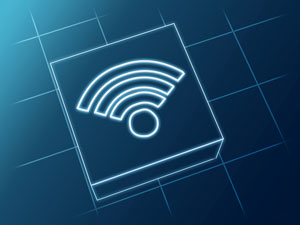Networking & Wireless
Campuswide WiFi Upgrade Enhances Learning at Lamar University

Photo: Shutterstock.com
Thousands of students, faculty, staff and visitors at Lamar University in Texas now have access to super-high-speed wireless thanks to a campuswide WiFi infrastructure upgrade. The university rolled out an 802.11ac WiFi network from Ruckus Wireless as part of an effort to infuse technology into the teaching and learning experience.
"Our users needed faster and more stable access to coursework, e-books, video and other digital curriculum tools that enrich the educational process, and our existing wireless network simply couldn't support the new levels of technology being put in place," said Pricilla Parsons, vice president of Information Technology at Lamar University, in a statement.
The new network enables the university to "securely connect tens of thousands of mobile and wireless devices being used on campus, while allowing university faculty to incorporate a wide range of education technologies and enhanced collaboration into their academic programs," according to a press release. The WiFi infrastructure will support applications such as the university's Blackboard learning management system, wireless access to data projectors, guest access, IP-based video security cameras in parking lots, and more.
With a variety of buildings on campus — such as laboratories, large high-capacity auditoriums, theaters, classrooms, soundproofed music halls, and older historic cinder block and concrete structures — Lamar's campus has always presented a challenge for WiFi connectivity. "Lamar has a mixture of almost every environment you can imagine, so getting WiFi to work and work well on such a large scale has been a daunting task," said Patrick Stewart, director of IT Computing Infrastructure, in a statement. "The challenge we have now is to deliver the WiFi density, connectivity and coverage required to adequately accommodate the multiplicity of smart mobile devices and online applications that students are using, virtually everywhere, on campus."
"Our students' personal devices are ubiquitous across campus, and if we aren't able to participate in our students' normal day-to-day lives with the technology they bring to bear, then we are going to be excluded from some very important engagement opportunities with them," Parsons added.
Lamar's new network uses indoor and outdoor Ruckus ZoneFlex Smart WiFi 802.11ac access points, centrally managed through redundant Ruckus ZoneDirector 5000 controllers within the university's data center. The Ruckus SmartCell Insight platform analyzes WiFi data such as user traffic volumes, throughput, estimates of clients, access point and client traffic, and session information. Ruckus ZoneFlex 7731 long-range, 5 GHz Smart WiFi point-to-point and point-to-multipoint bridges delivers broadband bandwidth to locations where running fiber was either not feasible or cost-prohibitive.
The university expects its revamped WiFi infrastructure to handle even more growth in the number and sophistication of mobile devices on campus in the future. "With innovations like connected watches and other WiFi wearables coming to market we must be able to easily scale capacity, coverage, and performance all at once," said Stewart. "We've actually seen concurrent client connections on a single Ruckus access point peak to 450 simultaneous users, as opposed to the legacy 50 to 70 users. This amazed us and gave us confidence that we are now poised to keep pace with the explosive demand for fast and reliable wireless connectivity anytime, anywhere."
About the Author
Rhea Kelly is editor in chief for Campus Technology, THE Journal, and Spaces4Learning. She can be reached at [email protected].

